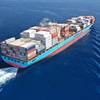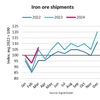U.S. port authorities are pleased about the passage of H.R. 3983, the “Maritime Transportation Antiterrorism Act of 2002,” by the House Transportation and Infrastructure (T & I) Committee on March 20.
“We thank Chairman Don Young (R-AK) of the House T & I Committee, and Subcommittee Chairman Frank LoBiondo (R-NJ) of Coast Guard and Maritime Transportation, for their leadership on moving to address maritime security,” said Kurt J. Nagle, president of the American Association of Port Authorities (AAPA). “We are encouraged about the $225 million authorized for Federal grants to help ports enhance seaport security, and the local flexibility provided for vessels and facilities to address terrorism at America’s ports. AAPA strongly supports enactment of Federal legislation to address maritime security.”
AAPA members met March 20 at their Annual Spring Conference in Washington, D.C., and heard from Chairman LoBiondo just prior to committee action on H.R. 3983. Rep. LoBiondo told ports that he was committed to increasing funding for Federal agencies and ports, that enhanced security should not be funded through new user fees on the industry, and that security measures should not impede the efficient movement of cargo. AAPA also embraces these goals.
Overall, H.R. 3983 takes a slightly different approach than the Senate bill, S. 1214, “The Port and Maritime Security Act of 2001. ” It is focused solely on terrorism and is not as detailed on planning requirements. The bill only covers areas that the Department of Transportation (DOT) determines are at risk of having a catastrophic emergency in the event of a terrorist attack. Also, because of jurisdictional limitations of the committee, the bill only focuses on DOT activities, not those of the U.S. Customs Service.
The bill is modeled on the Oil Pollution Act, in which Congress outlined broad planning requirements but left most of the details to the discretion of DOT. Like S. 1214, it requires a family of plans, including national, area and vessel/ facility plans. H.R. 3983 calls for grants over three years totaling $225 million (less than S.1214, which over a five-year period, calls for $390 million in grants), but limits them to technology.
Enhancing seaport security is a top priority for U.S. ports. Pubic port agencies want to maintain the safest, most secure facilities possible while moving goods efficiently to their destination. Increased Federal resources for public ports will be critical to enhance security in the areas of training for security personnel, controlling access, and physical security.
Ports work in partnership with government agencies like the U.S. Coast Guard and Customs, which protect water borders and inspect vessels and cargo. These agencies also need increased resources.
Subscribe for
Maritime Reporter E-News
Maritime Reporter E-News is the maritime industry's largest circulation and most authoritative ENews Service, delivered to your Email five times per week










